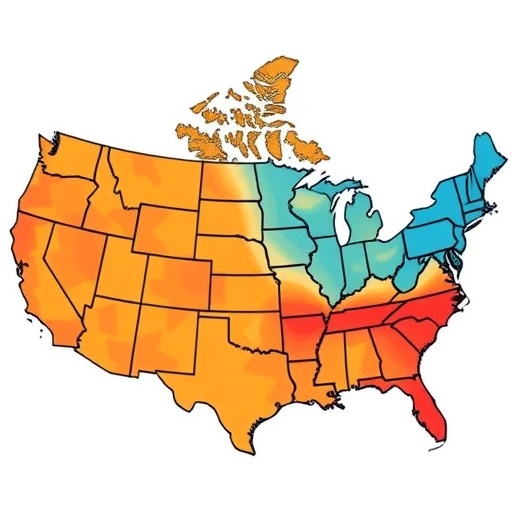The American Geophysical Union (AGU) and the American Meteorological Society (AMS), two preeminent organizations in the Earth and atmospheric sciences, have jointly launched a pioneering initiative titled the “U.S. Climate Collection: Informing Assessment of Risks and Solutions.” This collaborative effort seeks to establish a comprehensive and freely accessible portfolio of synthesis papers and assessment-centric climate science research articles, specifically focused on illuminating the multifaceted risks and adaptive solutions related to climate change across the United States.
This initiative emerges in response to a significant challenge faced earlier this year: the abrupt dismissal of key authors from the Sixth National Climate Assessment (NCA), a pivotal effort in cataloging and interpreting climate science for policy and decision-making in the U.S. In the wake of these disruptions, AGU and AMS recognized the pressing necessity to ensure that high-quality, peer-reviewed climate assessment research maintains a stable platform, unhindered by political or administrative turmoil, and continues to inform both public stakeholders and private-sector decision-makers.
At the core of the U.S. Climate Collection is the recognition that climate synthesis papers are more than academic exercises; they are vital instruments guiding urban planners, insurance companies, businesses, and policymakers through the complexities of a warming world. As AGU President Brandon Jones highlights, providing a dedicated and enduring home for these knowledge products not only safeguards their rigor but also advances accessibility for a wide audience ranging from scientists to community leaders.
The collection serves as a foundational resource poised to support forthcoming national and regional climate assessments, facilitating interdisciplinary collaboration and integration of the latest scientific insights. Given the increasing frequency and severity of climate hazards—from extreme weather events to long-term environmental transformations—this collection aims to synthesize heterogenous data streams and interdisciplinary modeling efforts into coherent frameworks for risk evaluation and mitigation.
AMS President David J. Stensrud emphasizes the societal imperative for sustained climate assessments: these rigorous evaluations shed light on economic, health-related, and social impacts stemming from environmental shifts. By underwriting continuous availability of peer-reviewed climate research, AMS and AGU are actively strengthening the scientific infrastructure needed for adaptive and evidence-based policy formulation.
Authors across the scientific spectrum are encouraged to contribute their work to the U.S. Climate Collection. Submissions are welcomed from all journals within the AGU and AMS publishing portfolios, encompassing disciplines as diverse as atmospheric sciences, oceanography, hydrology, and interdisciplinary Earth systems science. Of particular interest are synthesis articles that summarize existing knowledge, meta-analyses that integrate data from multiple studies, and methodological papers that enhance the design and implementation of future climate risk assessments.
An initial screening process, conducted by the collection organizers, determines the most suitable publication venues within the AGU and AMS journal ecosystems, ensuring the alignment of submitted manuscripts with journal scopes and audience needs. Following this, manuscripts undergo rigorous peer review to uphold the scientific integrity and quality that define the participating societies’ publications. Accepted papers are subsequently published as open access articles, enhancing their reach and impact among global scientific communities as well as policymakers and the general public.
To alleviate financial barriers to publication, the collection offers full or partial waivers of publication fees for authors who demonstrate economic need. This commitment to inclusivity fosters a diverse authorship and ensures that important scientific contributions can proceed without undue financial hardship, thereby enriching the breadth and depth of perspectives represented in the collection.
The indefinite submission window for the U.S. Climate Collection underscores the dynamic and ongoing nature of climate science. As understanding evolves and new challenges arise, the collection aspires to be a living repository—a continuously updated compendium that reflects the latest synthesis and assessment science necessary for informing U.S. climate resilience strategies.
A pivotal feature of the U.S. Climate Collection is its commitment to interdisciplinarity, bridging gaps among Earth system sciences, social sciences, economics, and public health domains. This integrative approach acknowledges that addressing climate risks and crafting solutions depends on multi-sectoral insights and collaborative methodologies, thereby reinforcing the collection’s relevance across a spectrum of decision-making contexts.
Recognizing the critical role of scientific societies in shaping research agendas and public discourse, both AGU and AMS reiterate their shared responsibility to uphold standards of ethics, equity, and inclusion in scientific communication. Their stewardship ensures that the collection not only advances climate science but also embodies principles of transparency, integrity, and community engagement, which are essential for maintaining public trust.
For researchers interested in contributing, comprehensive guidelines and submission details are available on the U.S. Climate Collection website. This platform serves as a hub not only for submissions but also as a centralized access point for the growing compendium of published works. By curating content across numerous journals, the collection facilitates discovery and cross-referencing, streamlining access to authoritative climate assessment literature.
In sum, the U.S. Climate Collection represents a strategic and forward-looking endeavor by AGU and AMS to secure a robust, accessible, and enduring scientific foundation for understanding and addressing climate risks in the United States. It exemplifies the vital intersection of rigorous science, thoughtful synthesis, and societal relevance, poised to inform policies and actions that can shape a resilient and sustainable future.
Subject of Research:
Article Title:
News Publication Date:
Web References: http://usclimatecollection.org, https://www.agu.org, https://www.ametsoc.org/
References:
Image Credits:
Keywords: Climate change, Climatology, Climate change effects, Anthropogenic climate change, Earth climate, Earth sciences, Scientific community, Academic publishing, Science policy, Environmental policy, Climate policy, Government research, Research priorities, Scientific associations, Scientific journals




